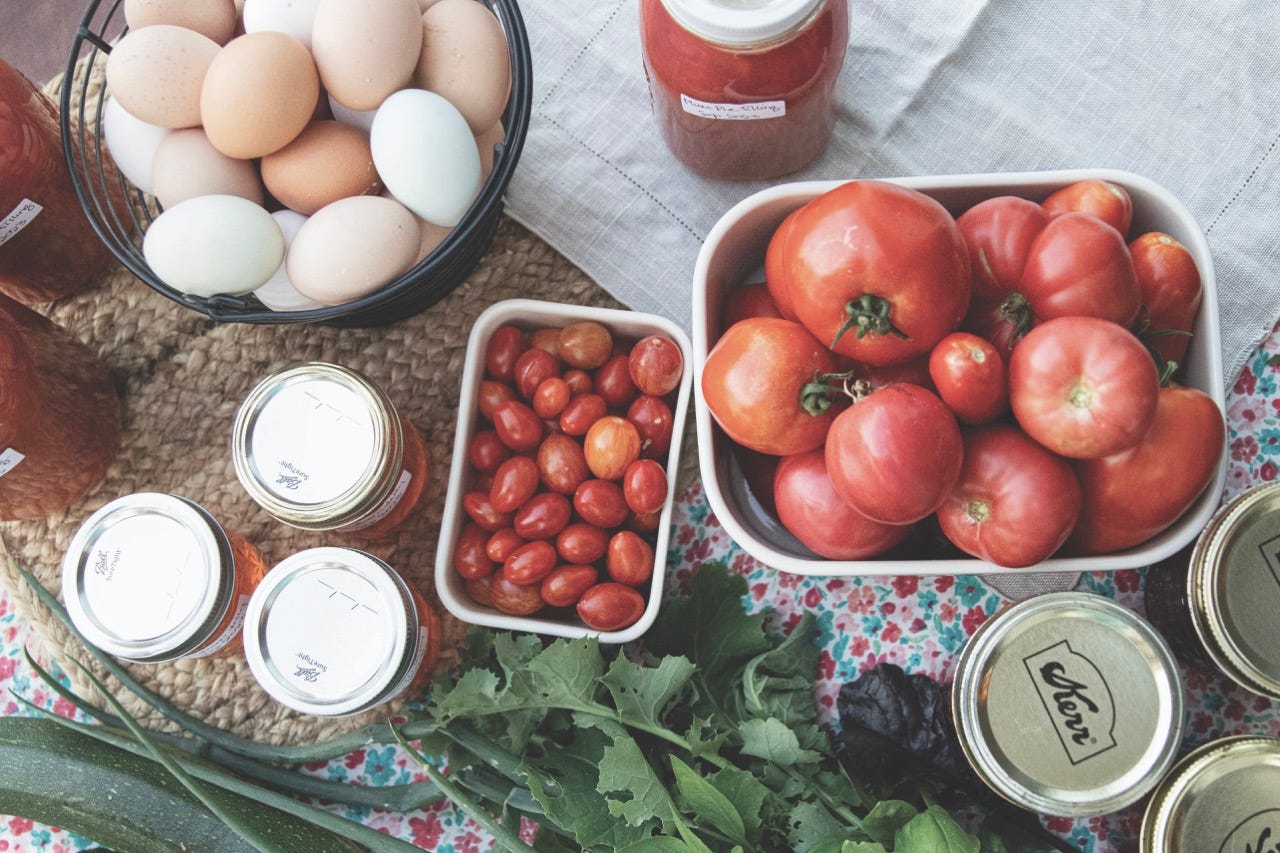A State of Mind
Words by Shawn and Beth Dougherty
A Sunday get-together in our community is not a quiet affair. People pull up in a variety of vehicles, few new, many rusty, some making dubious noises under the hood. Gravel grates under tires. Men, women, and children pile out of cars, more people than you normally see even disembarking from vans at a high school football game: our families are large (by today’s standards). Folding chairs, blankets, and toys litter the front lawn. There is the click and clink of dishes and serving utensils set down on the long tables against the house where, in a couple of hours, we’ll enjoy a potluck dinner.
In the front yard, dozens of medium-sized children start a noisy game of kick ball. Toddlers make for the swing set and sandbox. Adults take up conversations that have been ongoing for weeks, months, years; long searches for the best way to live, or to grow sweet corn, or to make an apple pie. The oldest kids take off into the woods on some mission of their own, but they’ll be back for mealtime, and add their voices to the multitudes. The welkin rings.
So, it’s not surprising that the woman next to me has to lean closer and repeat herself. Her expression is earnest.
“I think perhaps wealth is a state of mind.”
Family Values
In the shade of the porch, spilling out under our hosts’ three dooryard maples—red now, with autumn—a motley collection of camp chairs is mostly filled with women. Babies pass from lap to lap—a gift shared—or make dimples in the blankets at our feet. Men’s voices rumble in the machine shed, punctuated by clanks and thuds. The kickball game surges around the corner of the house, taking its noise with it. The family dog sighs and seeks peace in the dust under the porch steps.
Beside me is a conversation about math curricula. Three young mothers are discussing the relative merits of as many different programs, as well as the gifts—and challenges—of the small vessels they are attempting to fill. An older mom offers a thought from her own experience, but deferentially; every family’s need is different. Worn sandals shift in the carpet of fallen leaves.
Across the circle another group is sharing canning stories and glories: 10 quarts of grape jam, twenty-three of green beans, ninety of tomato sauce! And disasters, “…left the room only for a minute, but something clogged the steam-release thing on top, and…” One woman shares pickling instructions: “…apple cider vinegar, salt, grape leaves, garlic…” Quality and thrift are constant themes.
Plain Values
This group of families has been meeting for several years now, taking a Sunday each month to gather at one home or another. Sometimes, like today, we meet for a meal, sometimes for coffee or prayer. We look at one another’s farms. These may be small and simple, or larger, with some income generation intended, but all, most importantly, are a means of producing food for the family. Our afternoons together end early; most families have a cow or two at home needing to be milked.
Sometimes we are there to offer advice. Newcomers to our neighborhood may want help determining good land use: the best location for a kitchen garden, a potato patch, a hen house. Sometimes we are assisting with a job of work, and the men bring tool belts and pickup trucks, their wives, pies, and loaves of bread.
I look at the woman seated beside me. Her designer jeans have a patch on one knee; hay chaff clings to her lovely Irish wool sweater. I remember the first time I saw her family, four adults and six children spilling out of a higher-end van that had seen better days. One boy and one girl, older than the rest, remained by the vehicle, shielded by its bulk from the human river flowing past. Their rather formal sports clothes, spotless white and grey spandex, set them out against the general background of denim and hand-me-downs. Their small brothers and sisters, though, despite clothes unusually clean for this farm setting, immediately throw themselves into the thick of things.
I had heard their story: a high-paying tech job, a company take-over, mortgage payments impossible to meet, insolvency. How they ended up here is muddled, but there are family ties. Local land prices—too high for us—still look affordable to outsiders. With the loss of city wealth, an old dream of a different kind of success has resurfaced. The double-wide trailer home they are living in now is less than one-quarter the size of their suburban mock-mansion even without its grandma-apartment; now Grandma and Grandpa squeeze into the smallest of the four small bedrooms, and Grandpa has developed an unexpected skill with a chainsaw.
Parents’ Values
The feminine conversations around us have shifted focus; all are now honed-in on a single topic. First one voice, then another, makes a comment. When the discussion turns to the moral environment our children will be inheriting, all are serious, all are intent.
In truth, children are, for many of these families, the real reason for being here. No dreams of a life of country independence drew them to this land; no memories of a grandfather’s farm, its freedom and good food, made country life a primary goal. Fear, instead, was the motivator: fear and determination. Whatever cultural conditions might be “good enough” for adults who have only themselves to consider, when it comes to children, people are ready to make almost any sacrifice. If it takes leaving the city, with its status, amusements, “conveniences,” and “advantages” in order to separate their children from influences that would teach them to hunger for depravity and despise the sacred, then leave the city they do.
We are full of respect. Old, dusty cars and second-hand clothes seem right and ordinary to us, good tools that deserve respectful use, while useful, and a decent disposal when useful no longer. We are long familiar with the simple, the durable, the worn. But this woman’s expensive handbag, incongruously bulging with cloth diapers and baggies of raisins, tells of a past life where money, possessions, and economic status must have been important. Exchanging those for patched blue jeans and a garden with four rows of sweet corn and twelve pole bean towers must, we know, have taken real commitment.
It seems it also brought real joy.
The Value of Enough
I am reminded suddenly of a Sunday about thirty years ago, when our then-pastor told us a story. I don’t remember the sermon that day; I can’t recall the scripture readings we shared. My memory begins when Father segued to a visit, some years before, of the bishop from a more-than-usually poor district of Argentina. He came on a mission of brotherhood, and spent a week among us, seeing everything: schools and soup kitchens, crisis pregnancy clinics and drug-use recovery programs. He attended a high school football game; he had dinner in several homes.
When the bishop was getting ready to go back to South America, our pastor asked him a question. “You’ve seen our resources. Before you go, tell us what we can do for you; tell us how we can help your people.”
The answer, it seemed, must have been on the bishop’s mind even before the question was asked; maybe he had been mulling it over ever since he arrived. It didn’t seem, at first, like an answer. “Tell your people to live more simply.”
“We are not hungry,” the bishop explained. “We are not homeless. Babies are welcomed into our families, however they come to be there. We work hard, for not much money, but we don’t have a big drug problem. We’re doing okay.
But when we look North, that’s when my people begin to be troubled. You appear so wealthy. New cars, air conditioning, television, fashion clothing; these are the things that disturb my people’s comfort of mind. Beside such things, their simple lives can begin to look unworthy. They have enough, but sometimes your wealth makes them feel poor.”
Wealth
The kickball game collapses, panting, on the lawn. Over at the machine shed, the men conclude their tinkering in the bowels of a truck, its blue paint chipped, but the inner workings shiny with new grease and oil. The roar of its engine starting is like a declaration of success; then, after a celebratory crescendo, it grumbles into silence. In the quiet that follows, the dinner bell rings. The older children emerge from the woods. People in conversation fall silent. Heads are bowed; hats removed. Our host leads us in grace.
“Bless us, Oh, Lord, for these, Thy gifts, which we are about to receive from Thy bounty. Through Christ, Our Lord. Amen.”
Bounty. Gifts. Gratitude. This is what the woman next to me is talking about.
Yes, indeed—wealth is a state of mind.



